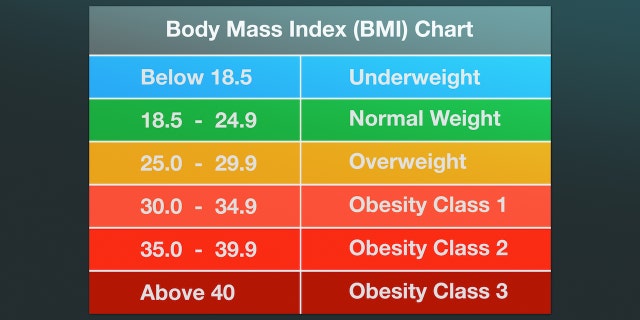
The American Medical Association (AMA) is now discouraging the use of body mass index (BMI), calling it an “imperfect” and “problematic” means of assessing body fat and claiming it has been used for “racist exclusion.”
The comments were included in a report presented at the 2023 AMA Annual Meeting in Chicago, Illinois earlier this month.
“BMI cutoffs are based on the imagined ideal Caucasian and [do] not consider a person’s gender or ethnicity,” the report stated.
WEIGHT LOSS SURGERIES ON THE RISE AMONG KIDS AND TEENS, STUDY FINDS: ‘ALTERING THE ANATOMY’
The AMA also claimed that the history of the BMI is rooted in “eugenics,” which is “the scientifically inaccurate theory that humans can be improved through selective breeding of populations,” per the National Human Genome Research Institute.
What is BMI?
First created back in the mid-1800s by a Belgian mathematician named Lambert Adolphe Jacques Quetelet, the BMI has been the international standard for measuring obesity since the 1980s, according to many sources, though some experts have questioned its validity.
A person’s BMI is calculated by dividing his or her weight by the square of his or her height in feet.

The American Medical Association (AMA) is now discouraging the use of body mass index, or BMI, as a means of assessing body fat. (iStock)
For example, someone who is 5’5″ and 135 pounds would have a BMI of 23.2.
On the BMI scale, any number lower than 18.5 is considered underweight, according to the Centers for Disease Control and Prevention (CDC).
A measurement between 18.5 and less than 25 falls within the healthy weight range.
Someone with a BMI between 25 and 30 is considered overweight.
Any measurement 30 or higher indicates obesity — while a number of over 40 qualifies as severe obesity, according to the BMI scale.
Some say BMI linked to ‘White supremacy’ and ‘history of harm’
The National Alliance for Eating Disorders, based in Florida, has voiced its support of the AMA’s recommendation to de-emphasize the BMI.
It also called for it to be scrapped altogether “due to its racist and sexist standards and long history of harm, including harm toward those most marginalized in our communities.”
DRINKING A GALLON OF WATER PER DAY: DOES IT REALLY HELP WITH WEIGHT LOSS AND FITNESS?
“We advocate for the recognition of weight diversity and hope that the medical field prioritizes health measurement tools that take into account the many factors that contribute to and impact a person’s health status,” said Dr. Katie Mittelstaedt, outreach and clinical consultant for group, in a statement to Fox News Digital.
Another eating disorder support organization, Project HEAL in Brooklyn, New York, echoes the claims that the BMI is rooted in racism.

First created in the mid-1800s, the BMI has been the international standard for measuring obesity since the 1980s. (iStock)
“The BMI is based on research from the 1830s meant solely to study populations of white European men and does not have the medical relevance or authority it has been purported to have,” said Serena Nangia, spokesperson for Project HEAL, in a statement to Fox News Digital.
WHITE POTATOES VS. SWEET POTATOES: NUTRITION AND HEALTH EXPERTS CHIME IN ON WHICH IS BETTER
“BMI has for decades been held inaccurately as the gold standard for the measurement of health, but its origins, as well as its uses, are rooted in white supremacy.”
‘It’s not racist — it’s called good medicine,’ doctor says
Dr. Marc Siegel, professor of medicine at NYU Langone Medical Center and a Fox News medical contributor, spoke out against the AMA’s stance on “The Ingraham Angle” earlier this week.
“I didn’t believe the AMA was going to get involved in cancel culture, but now they’re canceling the body mass index, which is the thing I look at to at least start me off in the direction of obesity,” he said.

The AMA’s call to abolish BMI could inhibit the ability to get insurance companies to pay for treating obesity, warned one doctor. (iStock)
The doctor said he uses the BMI as a basic guideline to determine whether a patient is in a category that requires closer monitoring.
“It’s not racist — it’s called good medicine,” he said.
Dr. Siegel said he believes the AMA’s new policy was fueled by the body positivity movement — but he cautioned that removing the BMI measurement is a step in the “wrong direction” and could “lead to bad health outcomes.”
He said, “We don’t have enough prevention as it is, and we’re moving away from prevention.”
Removing the BMI measurement is a step in the “wrong direction.”
The doctor warned that the AMA’s call to abolish the BMI could inhibit the ability to get insurance companies to pay for treating obesity.
CLICK HERE TO GET THE FOX NEWS APP
While Siegel does agree with the AMA’s assertion that visceral fat — which is fat that’s found in the abdomen — is the most worrisome type, he said he still relies on the BMI as an overall indication of whether someone is at a higher risk of diabetes, heart disease, cancer and high blood pressure.
CLICK HERE TO SIGN UP FOR OUR HEALTH NEWSLETTER
“I don’t need someone taking a tool out of my toolbox, and that’s what they’re doing here,” he said.
“This is politics, not medicine.”

 Latest Breaking News Online News Portal
Latest Breaking News Online News Portal




